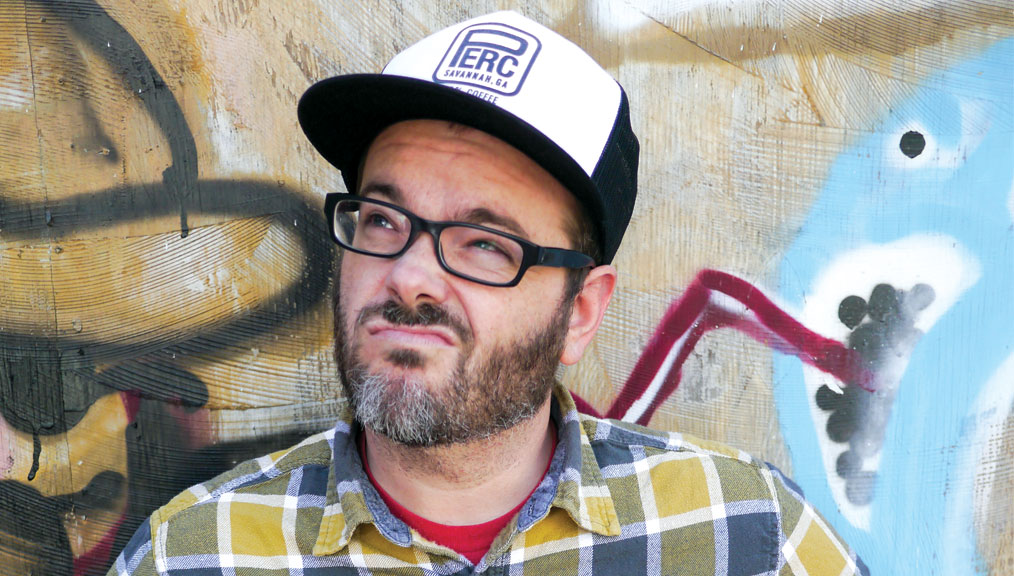Photo: Pete Mara.
[P]hilip Brown, the owner of Savannah, Georgia’s Perc Coffee, was in the coffee game for nine years before he ever picked up a trier and learned to roast coffee. Living in Athens, Georgia, and leading a touring band, he worked as a barista, then manager, and then as the general manager at a café. He then started a two-year apprenticeship as a roaster for the company, then moved into a regular roasting gig.
“The moment I started roasting on the big roaster,” he says, “I knew this was what I wanted to do.”
As much as he learned in the roastery, he’d learned a lot on the road too.
While on tour through the first decade of the 2000s, he saw coffee changing. Going to cafés on the West Coast or in Chicago made him want to approach coffee differently, and it made him want to approach it on his own terms. “I wanted to bring what I saw on tour to the Southeast. I wanted to lead that charge,” he says.
In 2010, with a Diedrich IR-12 and a heat sealer, a grinder, and a bike and backpack for deliveries he bought on eBay, he started Perc, choosing to base the new company out of a city with no experience with light-roasted, single-origin coffees.
This interview has been edited for clarity and space.
Why Savannah? You didn’t really have a connection there and the city had no experience with this type of coffee.
My wife and I looked at a bunch of places in the Southeast, we knew we wanted to stay in the Southeast. We looked at Nashville and Ashville, we looked at Charleston and we also looked at Atlanta. Out of all the places we looked, some of them already had some coffee and seemed like it would be a little bit harder to have an impact and others, I don’t know, just didn’t really speak to me. The local food scene was kind of hitting and people were excited about using quality ingredients, and that spoke to me as far as a place where I could make an immediate impact. I could be a part of something that was getting ready to happen in Savannah.
You started selling in 2010, but you started the company about six months before that. It takes a lot of bootstrapping to pull that off.
Yeah. I ended up finding a roaster, an IR-12, for like $7,000. My bike, I actually traded coffee for the bike, so it didn’t cost me anything. The heat sealer was 150 bucks and the grinder was like 1,500 bucks. So I was able to get started pretty inexpensively. I found a space where they only wanted $400 a month, but I made a deal where I provided the landlord with coffee and we only paid $350 a month. It really took a lot of pressure off me so I could get down what I wanted to present before I ever took a sample out. I could get some graphic design done and get the brand seeming like something before I took out samples. Then I got a few accounts and it started rolling. It was just me, working six or seven days a week, and sometimes doing pop-ups in the evening.
What was it like presenting coffee to a town and saying, hey, this isn’t like coffee you’ve had before?
It was certainly a challenge. And there’s still some challenges. At that time, I was so bought in and so excited about what I was doing and where coffee was going among the roasters that were inspiring me that I was really of the mind that lighter-roasted coffees and coffees that articulated the way that I was hoping to taste them were the only coffees that were, quote-unquote, good. Now I look at it much differently. Now I realize that there are people who will try coffees that are my absolute favorite and just not like them. I accepted that I was inspired to do something specific. My goal is to get people to go on that ride with me by being super cool about it.
How do you produce something very specific and even rigid without coming off as snobby?
I think one of the biggest problems in third-wave coffee is we put our baristas in a challenging position of presenting a product that is different from what customers are accustomed to, they need to be trained really well. They’ll need to have all the answers and give them while not messing up a pour-over, which can be tricky. I messed up a pour-over just the other week. Often, a barista is so bogged down, checking their scales, checking their times and making sure everything is just right, that they miss the customer. As many people will be excited to do business with somebody they think is cool as they will be to do business with somebody who they think is good at what they do. If we can bring those together, then we’ll have something special.
















